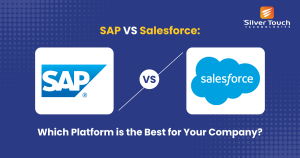The manufacturing industry has undergone drastic changes in the past few years. Today, companies belonging to the manufacturing industry require efficient production planning to meet customer demands, maximise profitability, and optimise the use of resources. To achieve all these at once, more and more companies are starting to invest in best-of-breed software to improve their business processes. This is exactly where enterprise resource planning comes in.
An ERP is a production planning software solution that comes with a set of applications and modules to manage the entire manufacturing process. Starting from production planning to supply chain management, everything can be taken care of by the ERP itself. In fact, ERP systems manage 43% of the data in the manufacturing industry, which is why the global ERP market is expected to reach $74.2 billion by the beginning of 2024. Here, we will focus on how ERP plays a crucial role in the production planning process.
An ERP is a production planning software solution that comes with a set of applications and modules to manage the entire manufacturing process. Starting from production planning to supply chain management, everything can be taken care of by the ERP itself. In fact, ERP systems manage 43% of the data in the manufacturing industry, which is why the global ERP market is expected to reach $74.2 billion by the beginning of 2024.
Here, we will focus on how ERP plays a crucial role in the production planning process.
What is Production Planning?
Production planning refers to the processes and strategies involved in allocating resources, like workers, raw materials, etc., for timely order fulfilment. It also includes planning for sales, managing the finances, and estimating inventory levels. Overall, it can be said that production planning optimises the overall manufacturing process; it makes the production process as efficient and profitable as possible. So, for businesses to operate properly, there needs to be a proper production planning process, and this can easily be achieved using an ERP production planning software.
How Does ERP Systems Increase Productivity in Production Planning?
An ERP system has completely revolutionised the production planning process for multiple businesses. The product planning software can integrate and streamline the complete production process. It does so by automating various tasks and offering real-time visibility over the entire production process. ERP also empowers organisations to optimise the various processes involved in production planning. That way, the companies can make well-informed decisions for themselves.
ERP solutions have the unique option of bringing the various departments and functionalities of a company onto a single platform. It serves as a centralised hub that can integrate departments like supply chain, inventory management, finance, customer relationship, etc. The integration of various departments on a single platform ensures that there is a smooth flow of information across the different stages of the production process. ERP also maintain better communication between the teams.
With an ERP system in place, manufacturers can acquire real-time insights into inventory levels, production schedules, and customer demand. This helps them to respond to market-changing conditions. With accurate and up-to-date information, the decision-making process becomes easy. In fact, the companies are able to make well-researched, data-driven decisions for themselves by uncovering specific trends within the industry.
Various Features and Modules of ERP for Production Planning:
An ERP system comes with different modules that are specifically meant for the production planning process:
Inventory Management:
The inventory management module is undoubtedly one of the most crucial modules of the ERP system. The module allows the inventory levels to be managed efficiently so that the business processes can take place smoothly and effectively. The wastage of products is minimised.
Supply Chain Management:
Supply chain management again forms a crucial part of modern ERP systems. The supply chain modules allow companies to bring about seamless transactions between the various supply chains, thereby increasing business productivity to a considerable extent.
Material Requirements Planning (MRP):
ERP systems can be used to produce the bill of materials (BOM) for all the finished goods, outlining the components and quantities of goods required for the production process. This is, again, a vital module for the ERP production planning system as it allows for proper management of raw materials.
Financial Management:
For any business to succeed, managing the finances is really important. Financial management is one of the key ERP functions. The ERP system ensures that the company finances are in order and the budgeting is done appropriately.
Quality Control:
The quality control module maintains quality across the various stages of the production planning process. With proper quality being maintained, the customer satisfaction rate can increase, and the company’s reputation becomes better.
Reporting:
The reporting module of ERP helps in generating various reports based on the exact business requirements. The report generation process can also be automated using various tools and technologies offered by the ERP solution.
What are the Benefits of ERP for Production Planning?
There are multiple perks of using ERP as your production planning software. Let us have a quick look at what these perks are:
Improved business efficiency:
Using ERP systems as manufacturing production planning software can allow manufacturing businesses to streamline their production process. The use of ERP improves the productivity of the workplace. The need for manual labour is reduced, again leading to enhanced efficiency. The chances of human error are also reduced.
Better resource allocation:
An ERP system facilitates accurate management and tracking of resources. This includes tracking equipment, labour, and raw materials. By optimising the resource allocation process,companies can prevent wastage and avoid understocking and overstocking of products. Resource utilisation can be optimised throughout the production cycle.
Real-time visibility:
ERP in production planning provides real-time visibility into various production activities like inventory levels, order status, production progress, customer demand, etc. An increased visibility allows the company owners and stakeholders to make strategic business decisions and respond quickly to market changes.
Enhanced communication and collaboration:
ERP systems enable seamless communication between the various departments involved in the production planning process. The teams can easily coordinate their activities, collaborate and align their efforts towards the company’s production goals. This reduces the chances of miscommunication to a significant extent.
Improved demand forecasting:
ERP systems use market trends and historical data to forecast demand. The business owners can use the results obtained to acquire a clear picture of future demands. That way, they can optimise their production schedules, manage their inventory levels and prepare themselves accordingly. As a result, the customer satisfaction rate increases.
Streamlined processes:
ERP systems come with numerous modules meant for standardising the process and ensuring that the highest quality is maintained during the production process. The ERP solutions can be used to track quality metrics and check whether the production processes comply with the industry rules and regulations.
Continuous scope for improvement:
By carefully analysing the production process and performance metrics offered by ERP systems, companies can easily uncover bottlenecks and identify scope for improvement. This helps them to take continuous improvement initiatives and remain competitive in this dynamic business world.
You May Also Like to Read: Best Cloud ERP For Manufacturing Industry – A Detailed Guide
Best Practices for Implementing ERP Software in Production Planning:
Here are some of the best practices that businesses need to keep in mind during ERP implementation:
Ensuring data accuracy:
Companies must try to maintain accurate, up-to-date data within their ERP systems. They should also regularly reconcile and validate their data for data integrity. This will help ERP systems to offer accurate results. Inaccurate data can lead to faulty production planning decisions and unfavourable outcomes.
Fostering collaboration:
Organisations must encourage communication and collaboration among the different departments that facilitate production planning. Cross-functional teams can work together towards a common production goal. Coordination issues can also be reduced.
Implementing reporting and monitoring:
ERP systems come with enhanced reporting and monitoring features. Companies can leverage this feature to carefully analyse the key performance metrics of production planning and identify inefficiencies in their business. They can then proactively address these issues and drive for continuous improvement.
Establishing standardised workflows:
Enterprises involved in the production process can try to establish standardised workflows within the ERP system. This ensures that proper consistency and efficiency are maintained. ERP can also clearly define roles and responsibilities within the organisation.
Regular system maintenance:
Performing regular maintenance ensures that the ERP system is up and running at all times. So, necessary measures will be taken to ensure that the ERP system is installed with up-to-date software upgrades. The patches will also have to be applied regularly for system stability and reliability.
Focusing on training:
Offering comprehensive training programs to the employees on how to use the ERP for the production process can be really beneficial. Companies should also try to encourage user adoption and provide ongoing support to address any kind of queries related to the ERP system. Only well-trained and confident employees can explore the ERP functionalities to the fullest.
Collaborating with an ERP vendor:
The best way to implement an ERP in a business production scenario would be to opt for the services of a reliable vendor. ERP vendors are well aware of the best practices related to production planning in ERP. They can offer the necessary guidance on how the ERP system can be integrated into the business infrastructure.
Revolutionize Your Production: Try Our ERP Software Today and Optimize Efficiency for a Smarter Tomorrow!
Choosing SilverTouch as your ERP Implementation Partner
For implementing sap production planning software, companies may get in touch with Silver Touch Technologies. At Silver Touch Technologies, we offer top-notch ERP implementation services to companies in the manufacturing industry. Our years of expertise in the industry and enhanced knowledge base have allowed us to offer nothing but the best possible services to our customers. We are well aware of the various features and functionalities of the ERP systems. So we can offer the customers the required services within a budget.
FAQs on Production Planning Software
Some of the key modules include:
- Inventory Management
- Material Requirements Planning (MRP)
- Supply Chain Management
ERP systems can offer business owners real-time visibility into inventory levels and production schedules. It also helps businesses optimise their production process and reduce lead time.





